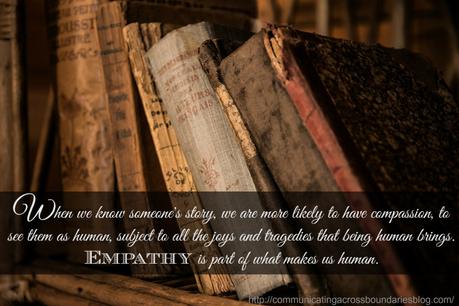
My husband and I repatriated to this country many years ago. We came from the city of Cairo, Egypt and arrived at Dulles Airport with five children, 26 suitcases, and an Egyptian Siamese cat. It was the sum total of everything we owned.
The first two years were excruciating. We didn't know anything about living as a family in the United States. From school to church, everything was new, everything was different. We didn't know how or where to shop, get licenses, set up utilities, or find doctors.
Loneliness would creep up on me at unexpected times and places, it's vice-like grip clutching my heart so that it felt difficult to breathe. I would find my solace in a couple of close friendships and in finding my safe spots - the odd coffee shop where I could retreat with a book and hot drink while the kids were in school; a space in our living room where the sun would shine in the afternoon, bathing the room with light.
The move was many years ago, yet every time I sit with an immigrant or refugee, I still remember the time as though it was yesterday. I still remember the loneliness and isolation I felt; the disconnect of coming from a relational society and moving to one that was based on the individual.
There is a body of research that points to the disenchanted immigrant as susceptible to becoming radicalized. More and more governments are paying attention to this and strategizing on what to do and how to change this trajectory.
The marathon bombing is a an excellent example. Tsarnaev was a part of the community in Cambridge - where we have made our home for the past 8 years. Tsarnaev was at the same high school as my daughter and they had many friends in common. He was a student in a school that deeply cares about tolerance and diversity. Yet, once Tsarnaev was no longer a part of that community, he was lost. Everything I have read or heard points to a fundamental loneliness and isolation that can be a part of the immigrant experience - the loneliness of being 'other', parents in Russia, hasn't spoken to his uncle for years, and living anonymously in a big city. This does not excuse or justify his behavior. His actions killed and wounded people and those wounds have scars to last a lifetime. Many people feel lonely and estranged and they don't build bombs and kill people.
I don't want to tackle the radicalization piece of this - it is too complicated and multi faceted. But the loneliness and isolation is important to address. How can those of us who understand what it is to be 'other', to be new to a place, extend friendship to those who are missing so much?
As I think about that question, I can't help but think about my husband. Through the years he has befriended hundreds of people who are immigrants or visitors in this country. He approaches them with genuine interest and understanding. He is not afraid to enter the story of a stranger. Our lives are so much richer because of the people that he has met.
The seats around our table at Thanksgiving are filled with immigrants, most of them present because of a conversation with my husband. Years ago, he memorized the capital cities of every country in the world and he knows several phrases in more than a dozen languages. All of this has brought our family rich friendships. From pictures to silver bowls to pungent spices, the items in our home are a witness to these friendships.
Loving the one who is 'other' is in the fabric of his being and all of us benefit.We are living in a time of fear and mistrust of immigrants and refugees. This is not new or unique to the United States, nor is it new to other countries. But it is still troubling. As long as we remain isolated in comfortable cul-de-sacs and enclaves, this fear and mistrust will continue and get worse. The only way to escape this problem is to take a deep breath and extend a hand of friendship. If you don't believe me, just ask my husband.

